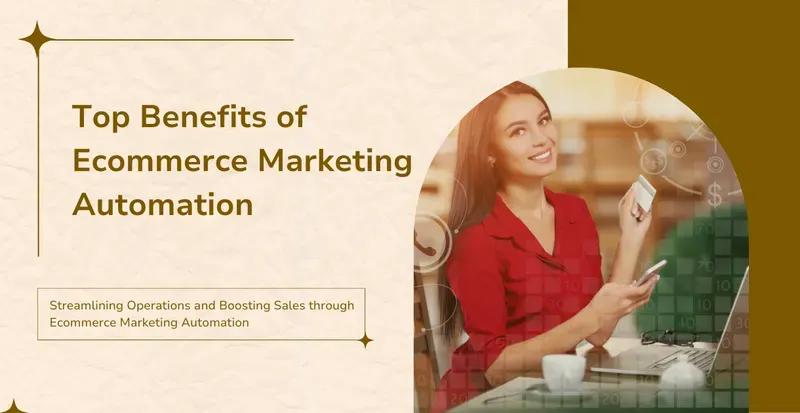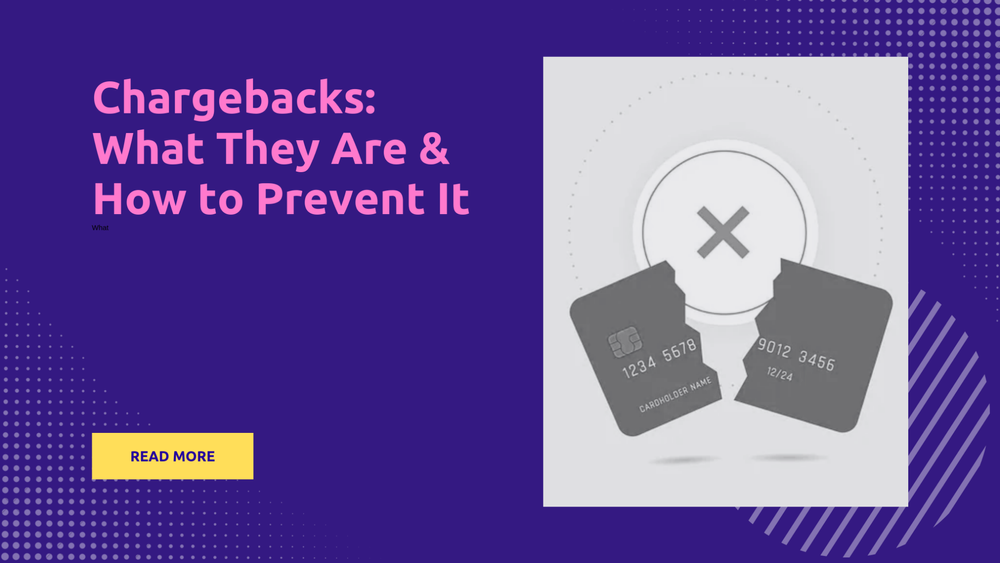Top Benefits of Ecommerce Marketing Automation
By Admin on

As an eCommerce business expands, the complexity of its marketing efforts increases. Marketing automation tools aim to assist in prioritizing and managing the diverse elements of online campaigns. With the number of eCommerce companies rising significantly, standing out from the competition requires a meticulously crafted strategy.
Drawing in new users and converting them into paying customers is a fundamental goal for any eCommerce enterprise. However, the challenge doesn’t end with the initial sale; ensuring repeat business is crucial. This involves analyzing website metrics, monitoring visitor activity, engaging with potential customers, among other tasks.
The article delves into the principles of eCommerce marketing automation, illustrating how it simplifies operations while facilitating business growth.
What is eCommerce marketing automation?
Ecommerce marketing automation is described as the use of software to streamline repetitive marketing chores. This encompasses tasks such as engaging with prospects, dispatching emails, and compiling data.
By employing marketing automation for an eCommerce business, valuable time is freed up, enabling the creation and initiation of marketing campaigns effortlessly. The era of recruiting individuals for routine duties has faded away, thanks to developers and organizations devising software solutions that eliminate the painstaking effort associated with repetitive tasks, thereby allowing concentration on other business facets.
What does eCommerce marketing automation include?
Automation is integral in managing marketing and sales engagement, offering the ability to design, execute, and automate campaigns or tasks across departments efficiently. This approach not only scales up marketing efforts but also ensures a consistent customer experience while delivering measurable results.
There are various automation software available, each serving different purposes, from simplifying workflows to handling analysis. Below are four valuable types of automation software.
Marketing Automation Software
This type of software focuses on simplifying and streamlining marketing processes. It’s used to automate repetitive tasks, such as email campaigns, and helps in tracking and analyzing marketing and sales data, providing a comprehensive view of marketing endeavors.
Workflow Automation
Workflow automation tools are particularly beneficial for high-volume retailers, helping ensure efficient order processing. They can update systems for shipped or returned orders, track inventory, and ensure accurate billing, sometimes even making recommendations based on past performance and projected demand.
Customer Relationship Management (CRM) Software
CRM software is designed to manage individual customer interactions, containing details like contact information and order histories. It enables the sending of personalized communications based on specific customer data or actions, significantly enhancing customer relations by ensuring timely and relevant interactions.
Web Analytics Software
Web analytics tools track how visitors interact with a website or online store, monitoring metrics like bounce rate, page views, and time spent on the site. This data is crucial for understanding webpage performance and optimizing campaigns and website UI/UX.
When it comes to email marketing automation, there are various tools designed to send emails based on user behavior or demographics, such as age or location. These include:
- Abandoned Cart Emails: which remind users about items they’ve added to their carts but haven’t purchased.
- Cross-sell and Upsell Emails: encouraging previous customers to make additional purchases with incentives.
- Customer Engagement Emails: like “Happy Birthday” messages with special discounts, aimed at strengthening customer relationships.
- Promotional Emails: to inform customers about discounts or clearance sales on specific products or categories.
Here are a few examples of Marketing Automation Tools:
- Klaviyo: Among the tools available for email marketing, Klaviyo stands out due to its user-friendly interface and pre-defined automation templates. It helps e-commerce businesses optimize marketing strategies and maximize revenue by sending personalized email campaigns.
- Mailchimp: Mailchimp offers a slightly different approach, serving as an all-in-one sales automation tool that’s intuitive for managing subscriber lists and tracking campaign performance. It supports various tasks, including welcoming new subscribers, re-engaging inactive ones, and following up post-purchase, with tools to grow the business and boost sales.
- Automate.io: For streamlining manual processes, Automate.io connects cloud apps to run actions automatically in response to events across different apps, without manual intervention after initial setup.
- Zapier: Similarly, Zapier, an online automation tool, connects favorite apps to automate repetitive tasks. It enables the creation of automated workflows (Zaps) that move information between apps effortlessly, supporting a vast number of eCommerce platforms and enhancing operational efficiency.
Customer Relationship Management (CRM) Software
Customer support and satisfaction automation encompasses software designed to automatically manage customer support issues and satisfaction inquiries. These tools streamline the process of organizing customer data, ensuring that when an individual requires assistance or wishes to make a complaint, the service team can swiftly access their records within the database.
Additionally, certain software solutions offer automated replies to customer inquiries or complaints and can fully replace a live chat department; these solutions are commonly referred to as Chatbots.
HubSpot – The Premier All-in-One CRM
HubSpot stands as a global leader in the inbound marketing and sales sector. It boasts a user base of over 8,000 customers across more than 90 countries, who leverage its comprehensive suite of software, services, and support to revolutionize the way brands attract, engage, and please their clientele.
HubSpot offers a robust and user-friendly marketing automation platform, particularly beneficial for small and medium-sized enterprises seeking to increase traffic and leads. Its Sales module includes a variety of tools and templates for email outreach, follow-ups, scheduling meetings, gathering lead intelligence, and more.
The HubSpot Service Hub provides customer service software designed to ensure delightful interactions at every customer touchpoint, from the website to the help desk. Despite its vast capabilities, HubSpot might present a learning challenge for newcomers, but it promises vast potential once fully integrated into your operations.
Chatfuel – The Simpler Approach to Creating Chatbots
Chatfuel empowers business owners and marketers to develop Facebook Messenger chatbots without the need for coding expertise. Its platform is accessible, allowing anyone from small business operators to large corporations to engage with their customers effectively and drive brand growth.
The use of a chatbot can instantly enhance engagement with website visitors, significantly reducing response times to mere seconds and thereby increasing the likelihood of converting visitors into customers. This is especially beneficial for businesses running Facebook ads that generate numerous product inquiries. Instead of allocating extensive time to respond to each query—many of which are repetitive—a bot can provide instant answers, streamlining the communication process.
Web Analytics
Ecommerce companies today have unprecedented access to data. However, not all possess the necessary resources or expertise to transform this data into actionable insights, underscoring the importance of web analytics tools in the eCommerce marketing automation toolkit.
Google Analytics
Google Analytics is a complimentary service designed to assist businesses in analyzing their marketing data. It gathers details about visitors to an eCommerce site and generates reports on visitor numbers, their actions, and the efficacy of marketing initiatives. With these reports, businesses are able to assess their content and make well-informed choices to enhance their marketing strategies.
Heap
Another pivotal ecommerce marketing automation tool in the realm of eCommerce analytics is Heap. This customer analytics platform autonomously records every interaction a user has on a website, offering businesses a comprehensive overview of user actions. Heap tracks a variety of interactions such as touches, clicks, taps, swipes, and transactions, providing continuous access to user data upon a single installation. This platform empowers businesses to identify their ideal customer segments via intuitive visual filters and advanced cohort analysis. It allows for the segmentation of users based on their behavior, with the option to integrate these segments with other marketing tools like email platforms or advertising networks.
These eCommerce marketing automation tools are designed to be compatible across different platforms, ensuring seamless integration regardless of the website technology used. For those utilizing Shopify or Woocommerce for their operations, a selection of top apps and plugins are available to simplify and optimize business processes.
Marketing automation apps for Shopify stores
Shopify offers a quick solution for setting up an online store, although it might be missing some essential features. To enhance the store’s functionality, installing certain apps is recommended.
Among the vast array of options, here are three top-rated marketing automation apps currently available:
Simple Shop Automation
This app streamlines the inventory management process. It automatically hides out-of-stock products from the storefront and notifies the owner, facilitating prompt restocking. Additionally, it keeps track of inventory daily to promptly display restocked items and alerts customers about the availability.
Fraudblock Fraud Prevention
FraudBlock safeguards businesses against fraudulent activities. After installation, owners can set a fraud threshold. The app leverages machine learning to evaluate new orders against known patterns of fraud. Orders exceeding the preset threshold are automatically canceled, enhancing security.
Shopify Flow
Flow, exclusively for Shopify Plus stores, offers comprehensive marketing automation capabilities without additional costs. Its functionalities include adding gifts to orders exceeding $100, sending discount codes after the second purchase, mailing handwritten notes following the third order, initiating nurture campaigns for preorder purchases, and setting up a support ticket for negative reviews, among others.
While WooCommerce remains a dominant eCommerce CMS, the focus here is on enhancing Shopify stores with effective marketing automation apps.
Marketing automation apps for Woocommerce
WooCommerce is a complimentary eCommerce plugin that enhances the beauty of online sales. Designed to work smoothly with WordPress, it is the most preferred eCommerce solution across the globe, offering store owners and developers unrivaled control over their online presence. This platform is known for its immense flexibility and vast array of both free and premium WordPress extensions, resulting in WooCommerce powering 30% of all online stores, a number surpassing any other platform available.
While WooCommerce is already equipped with various marketing automation tools, its functionality can be further amplified through the integration of third-party plugins. Among the plethora of options, here are three popular plugins adopted by store owners to turbocharge their marketing strategies:
Recommendation Engine
This plugin leverages artificial intelligence to present users with highly targeted product recommendations they are most likely to purchase. It encompasses three modules: Related Products By View, recording every product view to refine recommendations; Related Products by Purchase History, showcasing items frequently bought by the same customer; and Products Purchased Together, displaying items commonly bought in a single order. This tool smartly predicts customer preferences, much like the sophisticated algorithms used by Amazon.
AutomatorWP
AutomatorWP simplifies the creation of WordPress automation. Featuring a visual drag-and-drop builder alongside an intuitive interface, it allows seamless connections between WordPress activities. It not only facilitates plugin integrations but also enables configuration with email marketing automation tools such as Klaviyo or Mailchimp. The potential applications for AutomatorWP are boundless, especially when customized with webhooks for third-party solutions.
Push Engage
PushEngage serves as a web push notification service, enabling engagements with audiences across desktop and mobile platforms. The service permits sending unlimited notifications at no cost for the first 2000 subscribers. These push notifications are instrumental in re-engaging customers and streamlining marketing operations directly from one’s WooCommerce store. Push Engage’s integration with WooCommerce facilitates various automated notifications, encompassing order confirmations, abandoned cart reminders, shipping notifications, back-in-stock alerts, price drop announcements, and more.
How effective is eCommerce marketing automation?
To ensure customers continually return to an eCommerce business, the focus must be on delivery, selection, and price. When customers are satisfied with the products or services they receive, they are likely to return. However, for an eCommerce business to truly flourish, it’s imperative to enhance marketing efforts, including social media marketing, email newsletters, or other types of direct communication.
Marketing automation tools can streamline and manage the various aspects of online campaigns, offering a strategic advantage. As the eCommerce sector becomes increasingly crowded, standing out from competitors demands a well-thought-out strategy and extensive effort.
Automating marketing tasks can significantly simplify operations, potentially enabling automatic client acquisition and retention.



